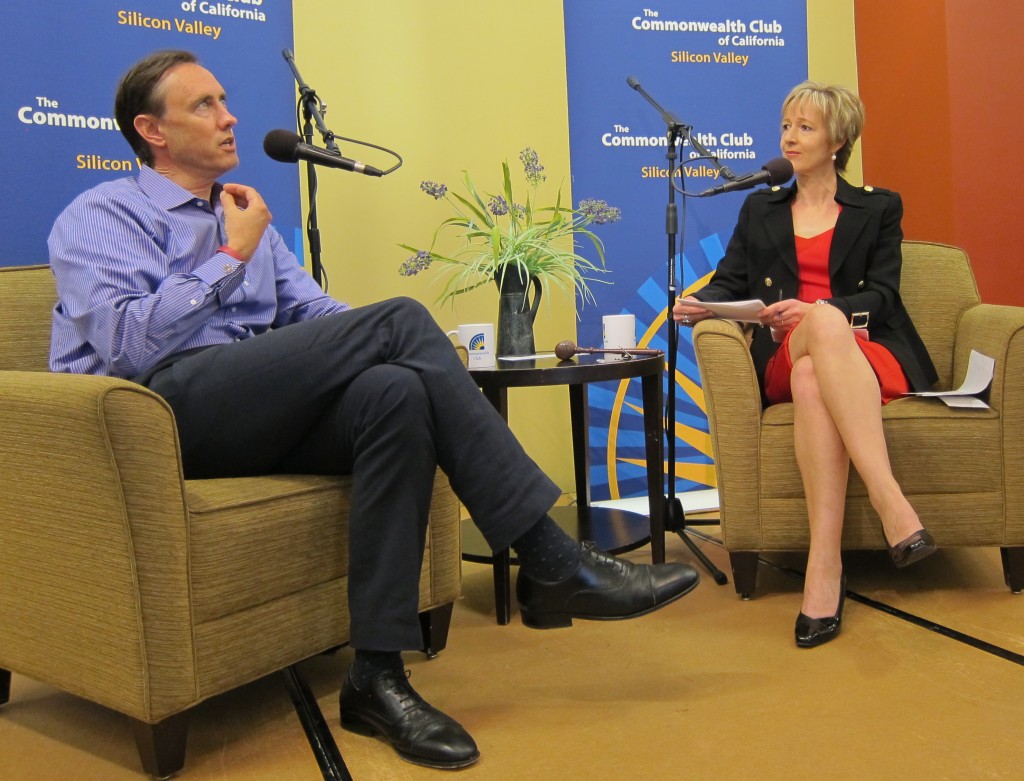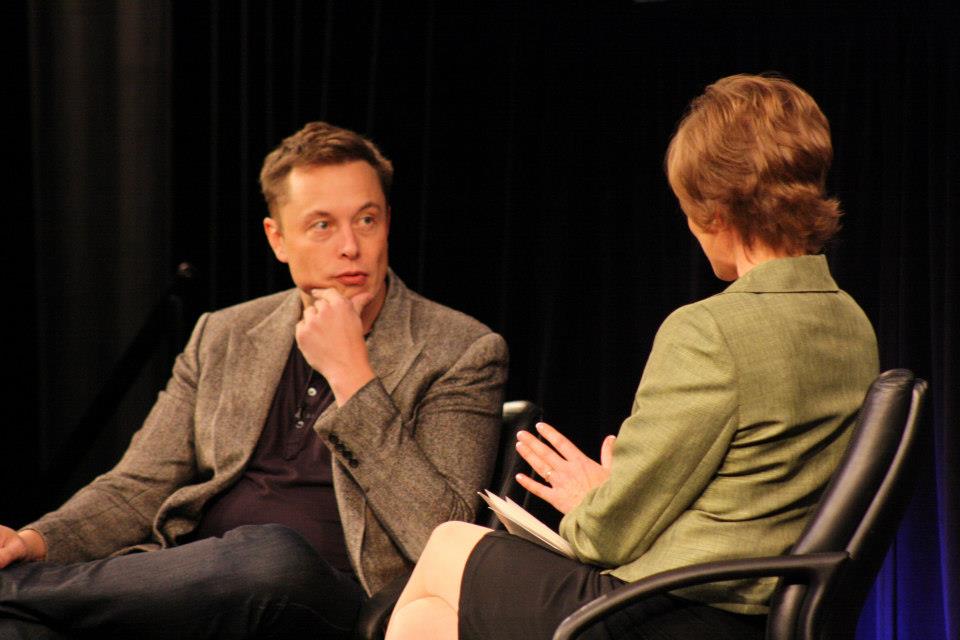By Alison van Diggelen, host of Fresh Dialogues
Technology has the potential to bring us a mind-blowing world of innovation, from self-driving cars to re-engineered food, and even colonies on Mars. Elon Musk and Steve Jurvetson are two of tech’s most influential minds. Here’s my BBC World Business Report on their vision of the future. Spoiler alert: It isn’t all good news.
The report aired today (May 6, 2015) on the BBC World Service. Listen to the podcast from 11:00
BBC Presenter, Mike Johnson: Colonies on Mars, self driving electric cars, re-engineered food… How will technology change our lives in the decades ahead? It’s certainly bringing us an extraordinary world of innovation. It’s known in the jargon these days as “future shock.” Many worry about the consequences, especially the toll that increased use of robots will take on jobs. Alison van Diggelen, creator and host of the Fresh Dialogues interview series reports from California
Audio: [Sound of Tesla Factory welding, metal on metal, robot sounds…]
van Diggelen: It was here in Silicon Valley, in 2012, the first Model S rolled off the production line at the Tesla Factory.
Tesla’s Gilbert Passin: See the robot is bringing the flat panel into the press…they are in slow motion …[factory sounds]
van Diggelen: The pioneering carmaker, Tesla Motors, has now produced over 70,000 all-electric cars and is gearing up for the release of the new Model X, a futuristic SUV with falcon wing doors. This summer, it will also start shipping Tesla Energy storage batteries for homes, businesses and utilities. Gilbert Passin leads the Tesla manufacturing team and is proud of the numerous red robots at the factory.
Passin: What we do here is really kick-ass. I mean, look around…. does it look to you like a boring old-fashioned car factory?
van Diggelen: Absolutely not.
Passin: We’re using the latest and greatest and even in some cases innovate in manufacturing techniques.
van Diggelen: The Tesla production team is so fond of its heavy lifting robots, they’re named after action heroes like Wolverine, Vulcan and Colossus.
Venture Capitalist, Steve Jurvetson drives the first Model S to come off Tesla’s production line. He has a reputation for putting his money where his mouth is and backing successful startups like Hotmail, SpaceX, and PlanetLabs. He’s a self-described “raging techno optimist” and has a front row seat on the future of innovation. I asked him what we should expect in the next 50 years…
 Steve Jurvetson: (If you look far enough in the future) All vehicles will be electric. We’ll have a Mars colony. We will have to grow more food than since the beginning of agriculture. That will be largely driven by GMOs and a variety of roboticized forms of farming…and moving off meat production in the way we think of it: killing animals. We will “grow” meat in different ways within 50 years and that will have pretty profound effects on Greenhouse Gases to… everything. Entrepreneurs like Elon Musk, are changing the world. In that 50 year horizon, the world’s going to look markedly different than today. Future shock is a perpetually occurring phenomenon.
Steve Jurvetson: (If you look far enough in the future) All vehicles will be electric. We’ll have a Mars colony. We will have to grow more food than since the beginning of agriculture. That will be largely driven by GMOs and a variety of roboticized forms of farming…and moving off meat production in the way we think of it: killing animals. We will “grow” meat in different ways within 50 years and that will have pretty profound effects on Greenhouse Gases to… everything. Entrepreneurs like Elon Musk, are changing the world. In that 50 year horizon, the world’s going to look markedly different than today. Future shock is a perpetually occurring phenomenon.
van Diggelen: As well as being CEO of Tesla, Elon Musk leads SpaceX, the aerospace company that recently launched its 6th mission to resupply the International Space Station.
Ambi: [SpaceX rocket countdown and blast off]
Tesla announcer: 5,4,3,2,1…and lift off…the Falcon soars from its perch to the international space station. [Rocket blasting….]
van Diggelen: But all this is just a warm up for the ultimate mission: a colony on Mars. In 2013, Elon Musk told me: “I want to die on Mars, just not on impact.”
He envisioned a philanthropic mission to Mars to install a greenhouse…and jumpstart the space race. Here’s Musk:
Musk: You’d have this great shot of a little greenhouse with little green plants on a red background. I thought that would get people excited…you have to imagine “the money shot.” So this would be the furthest that life’s ever travelled, the first life on Mars and I thought maybe that would result in a bigger budget for NASA and then we could resume the journey…
van Diggelen: Of course, in order to get to Mars, Musk and his team would have to invent a low cost space rocket. Enter, SpaceX.
Jurvetson: Being a multi planetary species, (having a colony on Mars and probably the moon) is one of those “greatest hits” in human evolution, up there with the opposable thumb…the neuron, multi-cellular beings.
van Diggelen: These grand visions are all very well, but what will life be like here on planet earth in 50 years?
For now, the tech economy is bringing manufacturing back to the US and Europe, but in the long run robots will take our jobs. This has huge implications for the world economy, business and public policy. Jurvetson admits he’s deeply worried about the growing rich-poor divide that tech innovation is exacerbating. He doesn’t pull his punches…
Jurvetson: Imagine the robots of the future… It’s inevitable the jobs will go away…and we need to prepare for that future…talk about it now so that the transition isn’t violent and horrible….40% unemployment, 80% unemployment…we’re gonna get there.
Check out other stories on Tesla, Elon Musk and innovation at Fresh Dialogues




